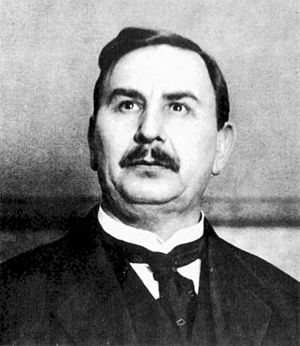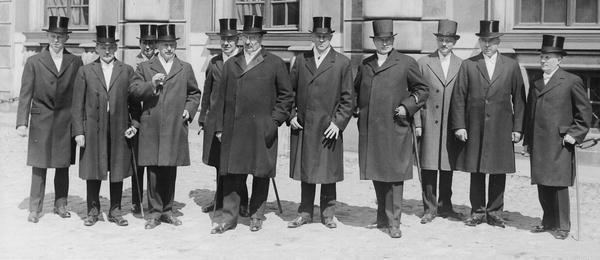Carl Gustaf Ekman facts for kids
Quick facts for kids
Carl Gustaf Ekman
|
|
|---|---|
 |
|
| Prime Minister of Sweden | |
| In office 7 June 1930 – 6 August 1932 |
|
| Monarch | Gustaf V |
| Preceded by | Arvid Lindman |
| Succeeded by | Felix Hamrin |
| In office 7 June 1926 – 2 October 1928 |
|
| Monarch | Gustaf V |
| Preceded by | Rickard Sandler |
| Succeeded by | Arvid Lindman |
| Minister of Defence | |
| In office 7 June 1930 – 19 June 1931 |
|
| Prime Minister | Himself |
| Preceded by | Harald Malmberg |
| Succeeded by | Anton Rundqvist |
| Minister of Finance | |
| In office 7 June 1926 – 30 September 1926 |
|
| Prime Minister | Himself |
| Preceded by | Ernst Wigforss |
| Succeeded by | Ernst Lyberg |
| Personal details | |
| Born | 6 October 1872 Munktorp, Sweden |
| Died | 15 June 1945 (aged 72) Stockholm, Sweden |
| Political party | Freeminded People's |
| Spouse | Laura Ekman (née Widlund) |
Carl Gustaf Ekman (born October 6, 1872 – died June 15, 1945) was an important Swedish politician. He was a Member of Parliament for many years, from 1911 to 1932. He also led the Freeminded People's Party from 1924 to 1932. Carl Gustaf Ekman served as Prime Minister of Sweden two times: first from 1926 to 1928, and then again from 1930 to 1932.
Contents
Early Life and Career
Carl Gustaf Ekman was born in Munktorp, which is now part of Köping Municipality, in Västmanland County. His father was a farmer and soldier, and his mother was Josefina Säfström.
He started working on a farm when he was just twelve years old. Even though he worked hard, he loved to read and learn. He became very involved in the temperance movement, which worked to reduce alcohol use. He rose through the ranks and became a director for a fund that helped members with disabilities and burials in the town of Eskilstuna.
In 1908, Ekman became the chief editor of a liberal newspaper called Eskiltuna-Kuriren.
Entering Politics
Carl Gustaf Ekman tried to get elected to the Riksdag, which is Sweden's parliament. At first, he didn't succeed because the Social Democrats were very strong in Eskilstuna.
However, in 1911, the Liberal Party helped him get a seat in the upper house of parliament for Gävleborg County. He quickly became known for strongly supporting a complete ban on alcohol in the country. In 1913, he moved to Stockholm and soon won a seat representing the city in the Riksdag.
A Powerful Politician
Carl Gustaf Ekman became one of the most influential politicians in the 1920s. He was seen as a surprising figure because he came from a working-class background but joined a non-socialist party.
He played a key role in the fall of several governments led by the Social Democrats. This included the governments of Hjalmar Branting in 1923 and Rickard Sandler in 1926. He also helped bring down the government of Arvid Lindman in 1930.
In 1924, Ekman became the leader of the new Freeminded People's Party. This party was formed after some Liberals who did not support the alcohol ban left to create the Liberal Party of Sweden.
Leading the Party
As the leader of his party, Ekman worked to make it stronger. He did this by working with both right-wing and left-wing political groups. His main goal was to control the middle ground in politics. He believed that if no single group had a clear majority in the Riksdag, his party could help decide what happened.
First Time as Prime Minister
After Rickard Sandler's government fell in 1926, Carl Gustaf Ekman became Prime Minister for the first time. He was quite successful because he managed to get support from both the right and the left.
During his time as Prime Minister, he solved a long-standing debate about local taxes. He introduced a new law about how taxes were collected, which is still used today. He also made big changes to the school system.
In the 1928 elections, the conservative General Electoral League won. This meant Ekman had to step down and give power to Arvid Lindman.
Second Time as Prime Minister
Ekman became Prime Minister again in 1930. This happened after he and Per Albin Hansson voted against the government's plan to raise taxes on grain.
His second time as Prime Minister was very challenging. The Great Depression, a worldwide economic crisis that started after the Wall Street Crash of 1929, reached Sweden. This crisis badly affected both factories and farms. Ekman believed in being very careful with money. This made it hard for him to agree to government spending plans that would cost a lot of public money to help the economy.
End of His Political Career
During his second term, questions arose about money his party had received from a businessman named Ivar Kreuger. At first, Ekman said he had not received any such money. However, the public discussion grew, and he eventually resigned from his position. This happened a month before the Riksdag election of 1932.
The election was a big defeat for the Freeminded People's Party. Carl Gustaf Ekman never returned to politics after this. Less than two years after he resigned, his party also disappeared. It joined with the Liberal Party to form the Liberal People's Party.
Even his political opponents did not believe he had taken money for himself. However, the confusion around his statements allowed others to create doubt, which led to his removal from power.
Legacy
Carl Gustaf Ekman's political career is often remembered for his clever political moves and the events that led to his resignation. However, he also achieved many important things during a difficult time when no single political group had a strong majority.
He passed away in Stockholm on June 15, 1945.
He was married to Laura Ekman (whose maiden name was Widlund), and they had four children together.
See also
 In Spanish: Carl Gustaf Ekman para niños
In Spanish: Carl Gustaf Ekman para niños
 | Aaron Henry |
 | T. R. M. Howard |
 | Jesse Jackson |


